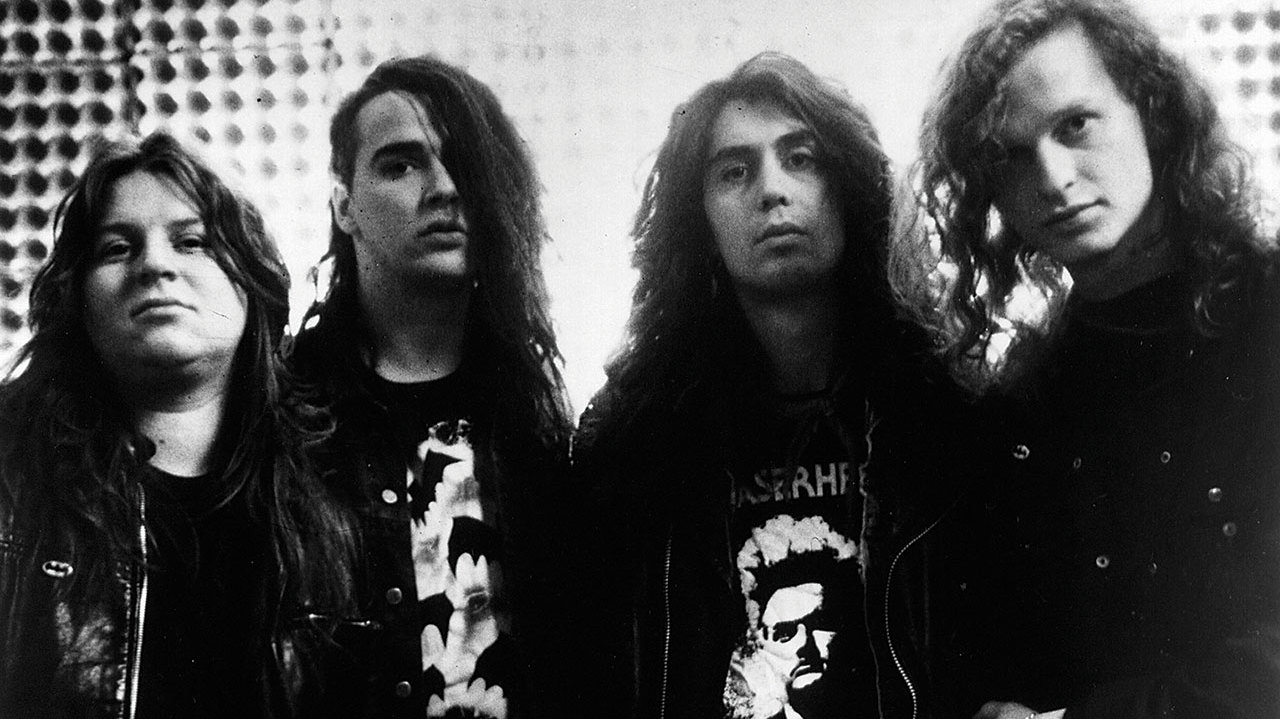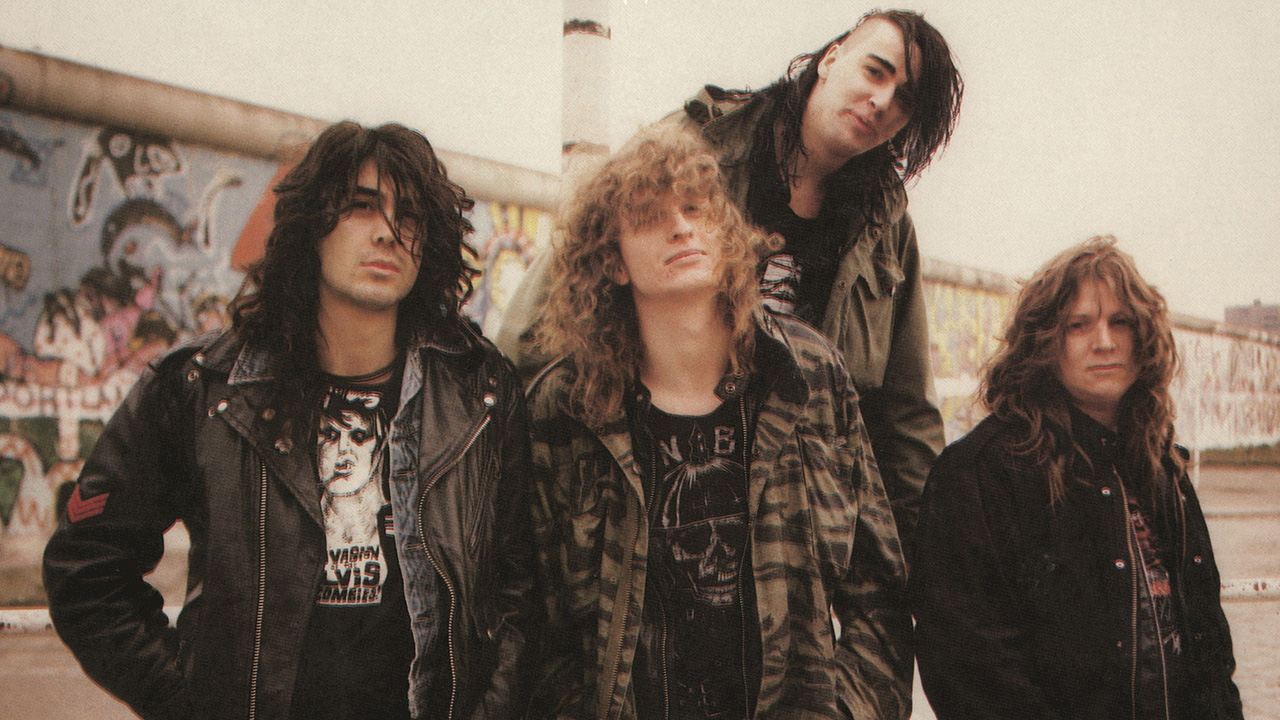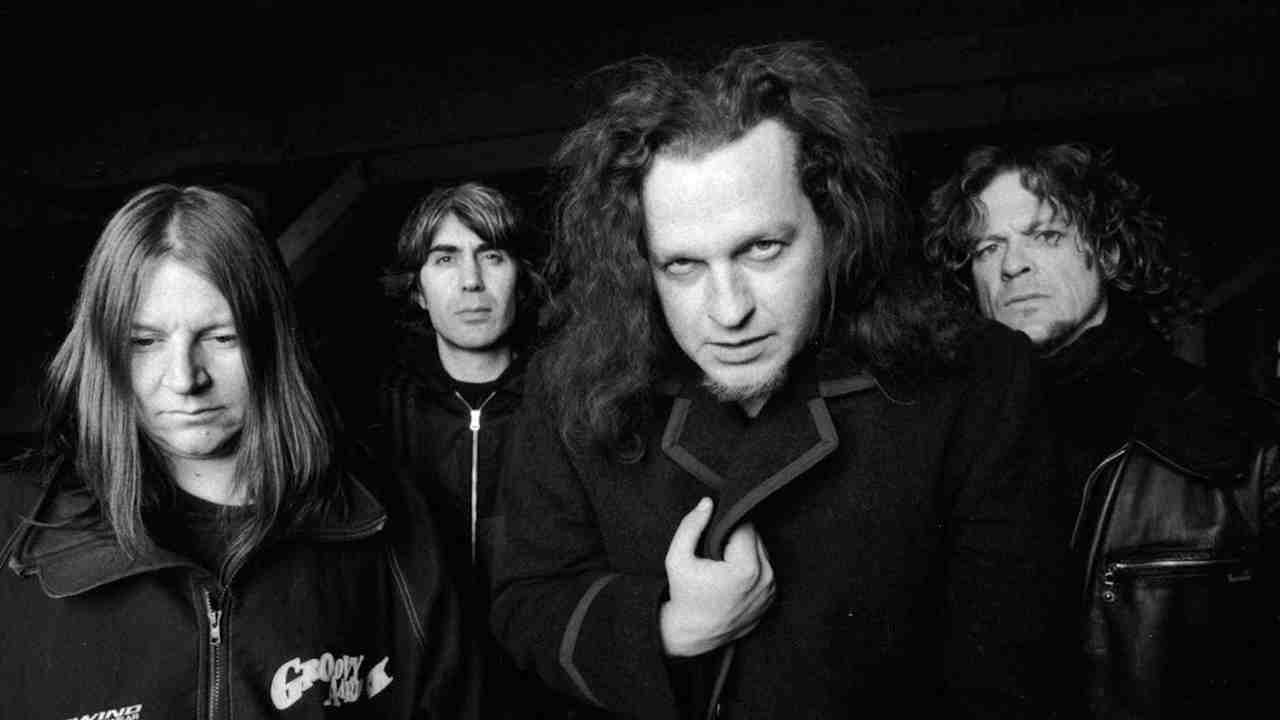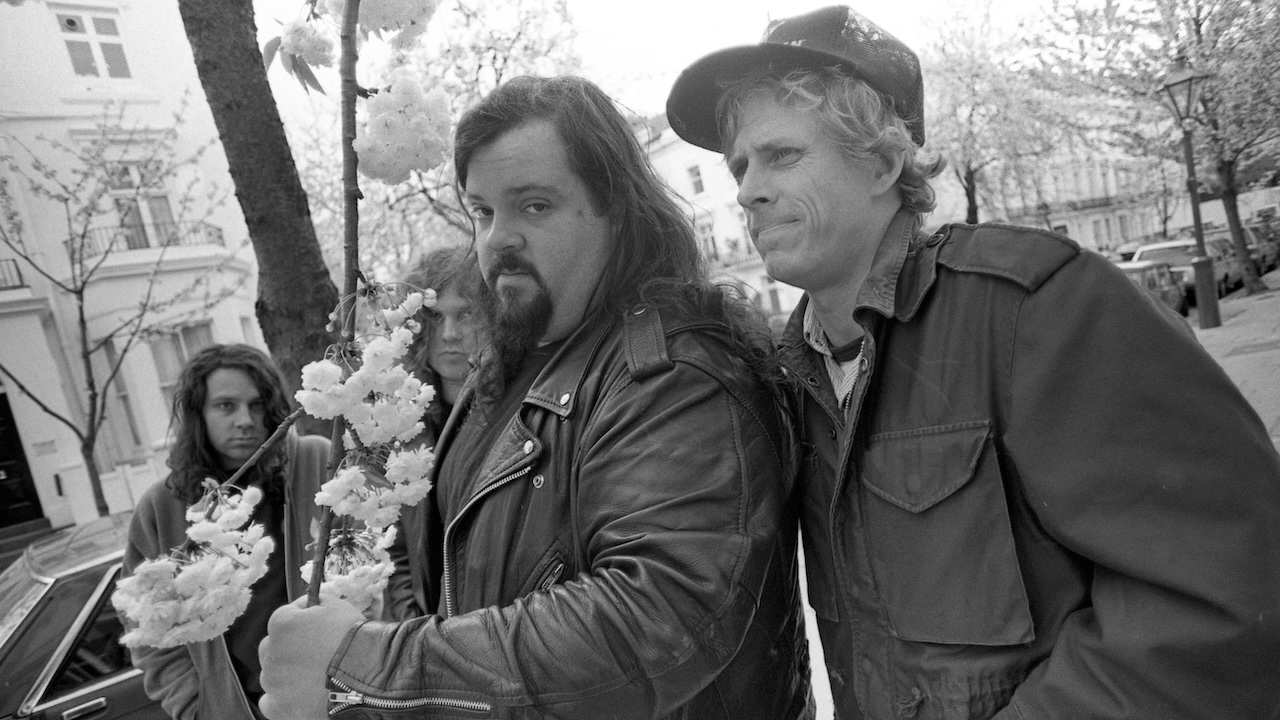“We were living with cockroaches, writing crazy concept albums and touring the planet”: how prog metal visionaries Voivod invented a whole new genre
Canadian prog metal icons Voivod released their classic second album Rrröööaaarrr on this day in 1986. Drummer Away looks back on a career like no other

Voivod are one of the founding fathers of modern prog metal thanks to a run of classic late 80s and early 90s albums that fused complex time-changes with head-spinning sci-fi concepts. In 2011, just before the band were due to revisit their classic album Dimension Hatröss at the Roaburn festival, drummer Michel ‘Away’ Langevin took Metal Hammer on an interstellar tour of his band’s career to that point.
Voivod are a band without peer. Blending elements of various heavy and forward-thinking music, including punk, thrash, industrial and prog rock, this Canadian institution has succeeded in drawing from a huge musical palette while at the same time maintaining a unique and unified vision that is all their own. The result is a dynamic and fast-evolving sound and a sense of almost disorientating ‘otherness’ that has always set them apart from their contemporaries, successors and, well, just about anyone else.
“Venom and Motörhead and of course Black Sabbath,” begins drummer Michel ‘Away’ Langevin in his soft French Canadian tones when asked about the band’s epic list of influences. “We listened to a lot of NWOBHM in our early years and covered Priest and Maiden, but we also liked to play Sex Pistols, GBH, Dead Kennedys, and were listening to a lot of progressive rock music like Van der Graaf Generator and Krautrock such as Can. Later we started to include elements of the alternative scene in England, stuff like Killing Joke and Bauhaus and a lot of elements from Foetus and Einstürzende Neubauten. Piggy [Voivod’s late guitarist and chief song- writer Denis ‘Piggy’ D’Amour] really loved to listen to contemporary composers like Bartók and movie soundtracks like The Thing and Mad Max and tried to incorporate this suspense-type music into the Voivod sound so that helped a lot to distinguish ourselves from other bands.”
Distinguished is a pretty apt description of the group, a point confirmed by their appearance next year as artists and curators at the highly respected Roadburn Festival. It’s certainly a long way from their humble and uncertain beginnings in 1980 at a small-town high school in Jonquière, Quebec, where guitarist Away and Piggy began jamming with a few schoolmates. Soon deciding that they needed to find more likeminded bandmates, the following year saw them forming a trio with bassist Blacky (born Jean-Yves Thériault), who Piggy had discovered DJing heavy metal in a local bar. It soon became apparent, however, that Piggy’s skills were some way ahead of his bandmates’, and Away in particular felt unhappy with his abilities, leading him to take a year off to practise.

“Piggy was already very versatile and knew how to play very well,” explains Away. “I believe he started to play guitar around nine so he had a headstart on us. When we started I only had one kick drum, and I guess I was alright for a while until I had to add another kick – ’cos that was a big metal thing – and that slowed me down for quite a while. In November ’82 we got back together and in January vocalist Snake [Denis Bélanger] joined the band. While I was away trying to get better, Blacky and Piggy had tried to forge a sound together.”
They certainly succeeded and the explosive results caught the attention of Metal Blade Records, who signed the band and released their debut album, War And Pain, in 1984, a definite turning point for the group’s members. They relocated en masse to Montreal, the largest city in Quebec, moving into a small flat together to concentrate on the band while overcoming their collective financial hardship.
“It seemed extraordinary that a label from Los Angeles would sign us,” explains Away, a hint of disbelief still evident in his voice, “and I started believing that we could make it, so we all quit school and moved to Montreal. Financially, of course, we knew it was going to be a disaster, because we were all on welfare, and at that time welfare was $150 a month, so there was a lot of crap dinners involved and we were living in a small cockroach-infested apartment. But we were really living the Voivod dream, in the sense that we were rehearsing every night, trying to write these crazy concept albums and touring around the planet, so they’re all good memories to me despite the fact that we were not that rich.”
Sign up below to get the latest from Metal Hammer, plus exclusive special offers, direct to your inbox!
As Away alludes, the band’s material was focused around a pretty detailed conceptual core, specifically a socially aware science-fiction theme which became more and more in-depth and apparent with successive releases. Influenced by science-fiction literature, conceptual bands like Rush and Magma and the era’s Cold War politics, the aesthetic of the band manifested in both the lyrics and the group’s unmistakeable artwork, which was planned and created by Away himself, who’d later be commissioned to design for artists such as Danko Jones and Dave Grohl’s Probot. The result was a fiercely distinctive identity that aptly matched the music’s individualist streak.
“I created the Voivod concept ’cos I was really into the magazine Heavy Metal and wanted to become an artist for them. I created the whole concept and drew all these characters. Then after, when we decided to call ourselves Voivod and talk about this concept in our music, I decided to draw this on all of our covers. By the mid-80s I felt that technology was beginning to get out of control with [the doomed space shuttle] Challenger exploding and Chernobyl and the Star Wars project; it really influenced us in our approach. Everything was in place for us to write totalitarian concepts and Big Brother-ish albums because of the Cold War.”
These themes became more apparent on the band’s second, third and fourth albums – Rrröööaaarrr (1986), Killing Technology (1987) and Dimension Hatröss (1988) – which were created over just three years, highlighting the effect living together had had on the group’s productivity, all the more astonishing given that they were balancing an album-a-year output with extensive touring. Interestingly, the latter two records were recorded in none other than Berlin, perhaps the epicentre of Cold War tension.
“It helped to have something really homogenous,” explains Away of the benefits of the housing situation, “as we were trying to develop the concept together and it became quite intricate, so we really had to work together as a team to make it happen. When we released Rrröööaaarrr we already had a tour booked with Possessed across Europe and were going to stop in Berlin and record Killing Technology, so we had to write it all before going on tour, and we had to do the same thing for Dimension Hatröss. These two albums we recorded in Berlin and were amazing experiences. We met a lot of artists and it had a strong impact on the albums we were making, especially as we were working on albums that dealt with totalitarian concepts.”
The hard work paid off and the excellent Dimension Hatröss succeeded in breaking the band to a wider audience, with the song Tribal Conviction playing on MTV and leading to a deal with the major label MCA. In retrospect it was all a rather unlikely recipe for commercial success. Not only was the whole record based around a pretty grand concept (the Voivod encounters a particle accelerator and creates eight ‘micro galaxies’ where it encounters primitive tribes, technocratic governments and mind control) but the songs bore a challenging edge with dissonant riffing and unusual time signatures highlighting the increasingly experimental nature of the band. These progressive traits would distance the band from their thrash/speed metal contemporaries and place the group alongside Swiss acts Celtic Frost and Coroner in a trinity of visionaries who would have a massive impact in pushing metal in new directions, opening doors for acts such as Opeth a decade later.

“We did our first US tour with Celtic Frost,” Away recalls, “and the people taking care of their instruments was Coroner and we really shared a lot of music on the bus, which was great. Many of these people were into Ministry and industrial and we were into the Krautrock and prog, so everyone discovered new music. It’s strange, but weird prog rock was popular in Quebec; the 70s music from many Quebec bands is very progressive too. We were always fans of King Crimson, and soon we were starting to put intricate parts until we really reached the peak on Dimension Hatröss. [Producer] Harris Johns showed me how to use a sampler, so I was able to add electronics, but not too much because everyone in the band was scared that we would become too industrial. I didn’t want to quantise everything and use beats, I wanted my stuff to remain human in that sense.”
The follow-up, 1989’s Nothingface, was both warmly received and well-selling. The band remained consistent for the most part, moving in what Away describes as a “psychedelic metal” direction with albums Angel Rat and The Outer Limits but the strains began to take their toll on the outfit, and both Blacky and Snake departed the group after each of those albums respectively.
With replacement singer/bassist Eric Forrest onboard, they became “more hardcore-orientated” with Negatron (1995), Phobos (1997) and the outtakes/rarities albumm Kronik (1998), before a car crash involving Forrest derailed the band. Though they would return with Snake and Metallica’s Jason Newsted on the band’s self-titled comeback album in 2003, even worse news was to follow two years later when founding member Piggy tragically passed away from cancer at the young age of 45. The following year the band released Katorz, the last album to contain Piggy’s playing before taking a hiatus to mourn his passing.
This was not to be the end of the group however, and in 2009 Voivod released Inferi, a record largely constructed using guitar parts written by Piggy before his death and his notes on how to use them. For Away especially it was a hard project to be a part of.
“It was very strange because I’d been working with Piggy for so many years and this was my first time recording in the studio without him. It was a really tough choice, and even though we are pretty underground we knew that some people would accuse us of going for a cash grab. Really, there’s not much cash to be made in Voivod at all, and in terms of hours of work I would say that I’m in the red quite often. We did it as a service to the fans, and because it was Piggy’s wish and we wanted to honour him, and I’m really proud we finished it.”
Which brings us more or less up to date with the mighty beast that is Voivod. Next year brings not only their Roadburn appearance (where they will play Dimension Hatröss in its entirety) and reissues of their 80s material, but also hopefully a new album. As Away explains, the two events are not entirely without connection, the band’s past directly influencing its present and future...
“The thing with relearning older material and working on the reissues is it reminds me of Piggy and that’s strange,” the drummer concludes. “Another strange part is to sort of recapture the way I was playing back then, because my style has changed and it’s like my body forgot how to play certain patterns. The fact that we learnt all the 80s material sort of brought back the Motörhead punk edge to the band and I’m sure its going to show on the new material, but the way I’m going to be playing on the new album is a bit of everything that I’ve learnt over the years. We hope to be recording in January, and go on the road next year. We really want to just keep going!”
Originally published in Metal Hammer 226
